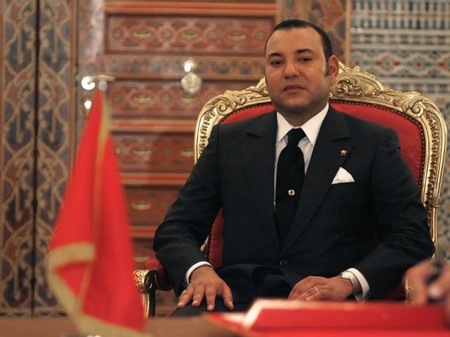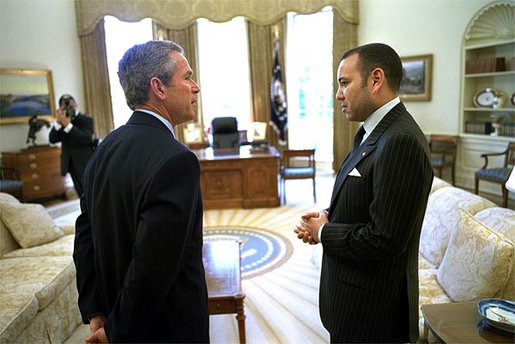<Back to Index>
- King of Morocco Mohammed VI, 1963
PAGE SPONSOR


Mohammed VI (Arabic: محمد السادس, born 21 August 1963) is the present King of Morocco and Amir al-Mu'minin (commander of the faithful). He acceded to the throne on 23 July 1999 upon the death of his father.
On the day of his birth, he was appointed Heir Apparent and Crown Prince. His father, King Hassan II, was keen on giving him a religious and political education from an early age. At the age of four, he started attending the Qur'anic school at the Royal Palace, and received a religious and traditional education.
After primary and secondary studies at Royal College and after he received his Baccalaureate in 1981, Mohammed obtained in 1985 a Bachelor's degree in law at the College of law of the Mohammed V University at Agdal in Rabat. His research paper dealt with "the Arab - African Union and the Strategy of the Kingdom of Morocco in matters of International Relations". He has also frequented the Imperial College and University of Rabat. In the same year of 1985 he was appointed President of the Pan Arab Games and commissioned Colonel Major of the Royal Moroccan Army on 26 November, and Coordinator of the Offices and Services of the Royal Armed Forces until 1994.
In 1987 he obtained his first Certificat d'Études Supérieures (CES) in Political Sciences and in July 1988 he obtained a Diplôme d'Études Approfondies DEA in Public Law.
In November 1988 he trained in Brussels with Jacques Delors, then President of the European Commission.
He obtained his doctorate in law (PhD) with distinction on 29 October 1993 from the French University of Nice Sophia Antipolis for his thesis on "EEC - Maghreb Relations".
Mohammed was promoted to the rank of Major General on 12 July 1994, the same year he became President of the High Council of Culture and Commander - in - Chief of the Royal Moroccan Army until 1999, the year he succeeded his father on 23 July, being enthroned at Rabat on 30 July.
He received an honorary degree (doctor honoris causa) from George
Washington University on 22 June 2000 for his promotion of democracy in
Morocco.
Shortly after he took the throne, he addressed his nation via television, promising to take on poverty and corruption, while creating jobs and improving Morocco's human rights record. Mohammed VI is generally opposed by Islamist conservatives, and some of his reforms have angered fundamentalists. He also created a new family code, or Mudawana, which granted women more power. The law came into effect in February, 2004.
In December 2010 Wikileaks published diplomatic cables which alleged high level corruption involving the King himself.
Mohammed VI also created the so-called Instance Equité et Réconciliation (IER), a commission, which was supposed to research human rights violations under Hassan II. The commission was however not allowed to report about human rights violations until 1999, when Mohammed was enthroned. This move was welcomed by many as a move towards democracy, but also criticized because reports of human rights violations could not name the perpetrators. According to human rights organizations, abuses still exist in Morocco. The 2011 Moroccan protests were motivated by corruption and general discontentment towards politicians in general and by the desire of better life conditions motivated by the economic crisis. The King has answered the protesters with the promise of further reforms.
In a speech delivered on 9 March 2011 the King said that parliament would receive "new powers that enable it to discharge its representative, legislative and regulatory mission". In addition to the powers of the judiciary being granted independence from the King. And the king announced that he was impaneling a committee of legal scholars to produce a draft constitution by June.
On July 1 voters approved a set of political reforms that the King proposed. The reforms consisted of the following:
- The Amazigh language is an official state language along with Arabic.
- The state preserves and protects the Hassānīya language and all the linguistic components of the Moroccan culture as a heritage of the nation.
- The king has the obligation to appoint a prime minister from the party that wins the most seats in the parliamentary elections. Previously, he could nominate a technocrat in this position if no party has a decisive advantage, over the other parties, in terms of the number of seats in the parliament.
- The king is no longer "sacred" but the "integrity of his person" is "inviolable".
- High administrative and diplomatic posts (including ambassadors, CEOs of state owned companies, provincial and regional governors), are now appointed by the prime minister and the ministerial council which is presided by the king, previously the latter exclusively held this power.
- The prime minister is the head of government and president of the council of government, he has the power to dissolve the parliament.
- The prime minister will preside over the council of Government, which prepares the general policy of the state. Previously the king held this position.
- The parliament has the power of granting amnesty. Previously this was exclusively held by the king
- The judiciary system is independent from the legislative and executive branch, the king guarantees this independence.
- Women are guaranteed "civic and social" equality with men. Previously, only "political" equality was guaranteed, though the 1996 constitution grants all citizens equality in terms of rights and before the law.
- The King would retain complete control of the armed forces, foreign policy and the judiciary; authority for choosing and dismissing prime ministers and he would retain control of matters pertaining to religion.
- All citizens have the freedom of: thought, ideas, artistic expression and creation. Previously only free speech and the freedom of circulation and association were guaranteed.
Until recently the king and his family held stock in the Omnium Nord Africain (ONA Group), a holding company with a diverse portfolio (mining, food processing, retail and financial services, etc.), although a new constitutional implementation disallowed this. Mohammed is estimated by Forbes magazine to be worth $2 billion and the Moroccan Royal Family has one of the largest fortunes in the world. His palace's daily operating budget is reported by Forbes to be $960,000, owing much of it to the expense of clothes and car repair.
Royal involvement in business is a hot topic in Morocco but public discussion of it is sensitive. The US embassy in Rabat reported to Washington in a separate cable that "corruption is prevalent at all levels of Moroccan society".
Corruption allegedly reaches the highest levels in Morocco, where the business interests of King Mohammed VI and some of his advisors influence 'every large housing project,' according to WikiLeaks documents quoted by Britain's Guardian newspaper. The documents released by the whistleblower website also quote the case of a businessman working for a US consortium, whose plans in Morocco were paralyzed for months after he refused to join forces with a company linked with the royal palace. Decisions on big investments in the kingdom were taken by only three people, the documents quote one of the executives of a company belonging to the royal family as saying.
The three are the king, his secretary Mounir Majidi, and the
monarch's close friend, the politician Fouad Ali Himma, the executive
said at a meeting with potential investors in a Gulf country. The
corruption affects especially the housing sector, the WikiLeaks
documents show.
Mohammed, who was born in Rabat, has one brother, Prince Moulay Rachid, and three sisters, Princess Lalla Meryem, Princess Lalla Asma, and Princess Lalla Hasna.
On 21 March 2002 in Rabat, he married Salma Bennani (now H.R.H.
Princess Lalla Salma)
in Rabat, and she was granted the personal title of Princess with the
style of Her Royal Highness on her marriage. They have two children,
Crown Prince Moulay Hassan, who was born on 8 May 2003, and Princess
Lalla Khadija, who was born on 28 February 2007.
